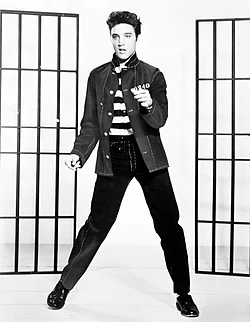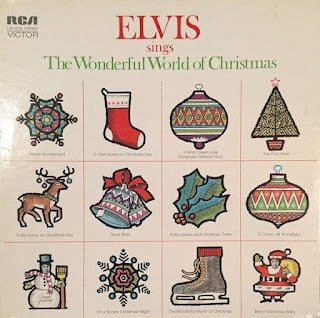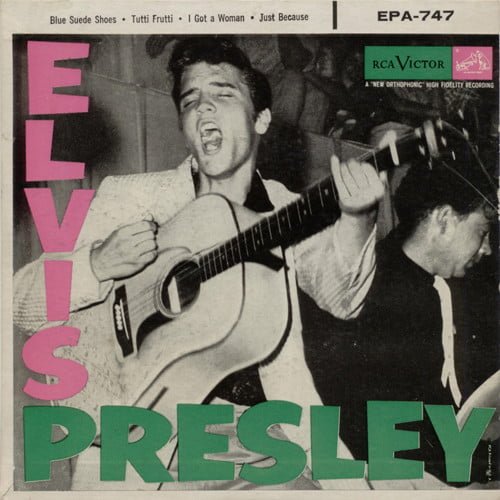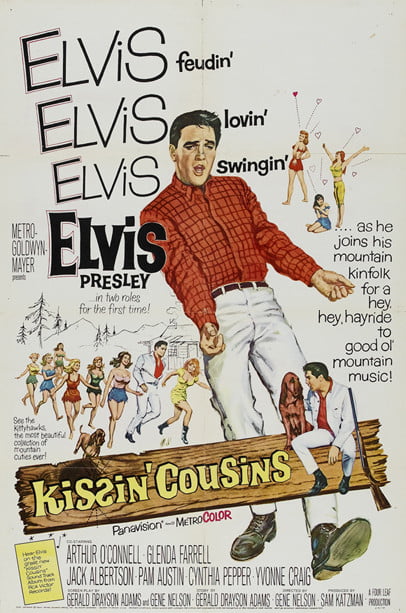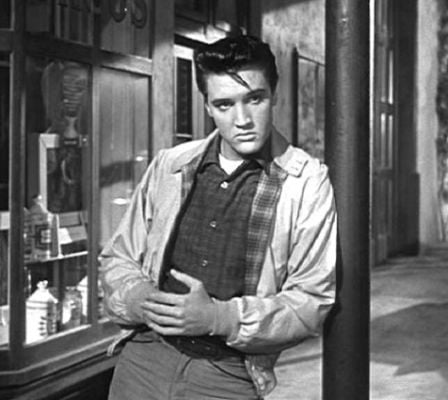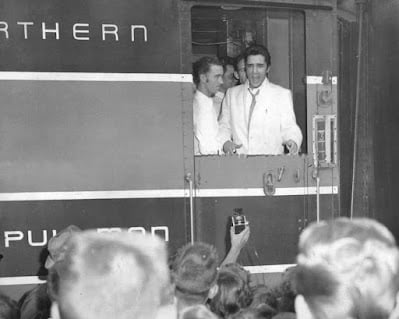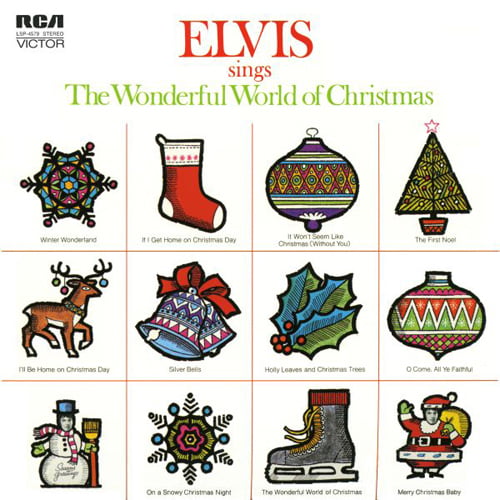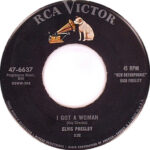
“Elvis Sings The Wonderful World Of Christmas” (1971)
By Mahnuel Muñoz
The voice is an indiscreet window into the soul of a singer and shamelessly shows the flowers and the trash. With Elvis it is a very obvious fact; Aside from the beauty of the voice, his singing makes us participate in the emotional state of the man and/or the artist. A seasoned fan is able to distinguish the joy of Elvis when performing a sad song and the pain while singing a happy song: they are slight nuances, such as the pressure he exerts on the high notes and the way he covers them, or the care with which that rounds out the low notes. And of course, his way of using inflections, pauses, legattos and stacattos to immerse us in the story.
For this reason, it is particularly interesting – and somewhat sad – for me to undertake the analysis of “Elvis Presley Sings The Wonderful World Of Christmas” (1971), a work that was intended to succeed the emblematic “Christmas Album” of 1957 and was reduced to a sweet Christmas with a bitter heart, a seasonal product whose dreamy packaging and arrangements could not hide that its protagonist was going through dark days. The voice confessed everything to us.
1971 was a year of strong contrasts; It began with his appointment as one of the Ten Outstanding Young People of the Year by the Junior Chamber of the United States, an honor previously granted to figures such as Leonard Bernstein, Orson Welles or Howard Hughes.
The phenomenal LP “Elvis Country” arrived in stores, which was well received by critics and the public. However, his first concert season in Las Vegas was marred by the flu, which reduced the intensity of some recitals.
Away from the stage and the lights, Elvis seemed unable to focus his energies on art, perhaps due to serious eye ailments and the fact that his relationship with Priscilla had descended into mutual indifference. For this reason, the recording of the Christmas album – which was carried out after constant insistence from Colonel Parker – was contaminated by Elvis’s lack of motivation that soon spread among the musicians.
Four days of sessions were called in March 1971 but in the end they only worked one night, in which Presley ignored the agenda to record several folk songs and a spiritual.

A new call starting on May 15 was much more productive, with a final balance of thirty songs in one week, among them, those that make up “The Wonderful World Of Christmas.” But the work environment was rarefied, lacking the creativity of yesteryear and dominated by haste, with Elvis little involved and exhibiting mood swings. The magic only returned when he was able to connect with the music that was made available to him, which was usually material that appealed to his cultural roots or his personal moment.
The album is born, precisely, with some of said magic, a solemn and beautiful version of “O Come, All Ye Faithful” (English adaptation of “Adeste Fideles”, a hymn born in the 17th century, of uncertain origin, attributed to John Francis Wade The beginning of the song, with Elvis, The Imperials and David Briggs’ piano, is magnificent for its simplicity and elegance; Presley restrains his voice so as not to distinguish himself from the chorus or break the serene beauty of the moment. After the first turn, the drum beats lead us to a sudden unfolding of the piece, with the entry of the strings, the bass, the percussion and female voices, like authentic angels. The male chorus, including Elvis, maintain their position, the apex of the theme is crowned without excess and the piece concludes majestically, but understandable.

The next track, “The First Noel” is another old hymn whose origins are in 19th century England. A warm and minimalist instrumentation is chosen starring the organ. Here Elvis tries to sing with the pertinent delicacy, but somehow the tone sounds forced and transmits a tension, inappropriate to the story, which is hidden when the chorus enters.
“On A Snowy Christmas Night” is a composition by Stan Gelberg, who already wrote “My Desert Serenade” in 1965 for the soundtrack of “Harum Scarum”.
It destroys the ancestral atmosphere created so far to replace it with a pop stage of little interest. Elvis himself dispatches it with a flat interpretation that could easily pass as a mere rehearsal of the lyrics with the musicians and the background choir. The low voice emission transmits drowsiness instead of dreaminess and the sudden rises in the chorus, far from exciting, startle. A clear example of the lack of work in a piece that, on the other hand, fails both in form and substance.
The anticlimax continues with “Winter Wonderland” (an old standard from 1934 that has charm in the hands of Bing Crosby and Dean Martin but that cannot be saved here despite the juicy bluesy coda) and the song that gives its name to the album, a vulgar piece from which Elvis does not want (or cannot) extract the slightest atom of flavor.
In “It Won’t Seem Like Christmas (Without You)” a completely different Elvis is revealed to us, closer to the honest and forceful artist that we fall in love with. The topic was recorded on the first day of sessions; The singer therefore seems more focused and inspired after a magnificent recording of “The Miracle Of The Rosary” – which would have been a much more valuable addition to the album than either of the previous two – and the anguished tone that colors his vocal cords provides the precise touch of bitterness to this country lament by J.A. Balthrop with which the King – perhaps unconsciously – introduces us to an interesting saga of four songs within the album that tell us a story that could have been a splendid guiding thread of the album.
“I’ll Be Home On Christmas Day” is a blues by composer Michael Jarrett (author of another beautiful lament recorded by Elvis, “I’m Leavin”) that seems to take up the story of the previous song, taking his desolate protagonist and putting him on the path back to his home and the arms of his beloved. Elvis gives the narrative a convincing tone of defeat, of afternoon drunkenness – as a prequel to that magnificent “Sunday Morning Coming Down” that he considered recording at this time and unfortunately never did -, sowing the doubt as to whether the character ” took that train.”
But the doubts are dispelled with “If I Get Home On Christmas Day”, a hopeful song written by the English composer Tony Macauley, which places its protagonist very close to his home and his love. It is a bright and rich melody that Elvis sings and performs diligently.
The next song, “Holly Leaves And Christmas Trees” is a fairly basic composition by Red West and Glen Spreen that however takes on a greater dimension if we consider it the outcome of the four-part story; a bitter outcome, since, when he arrives home, his beloved is not present. Resigned, the character loses himself in the night when everyone is happy, oblivious to his tragedy:
“The sparkling lights and the mistletoe/ They don’t mean anything when you’re not here As I walk down this lonely street/ With the sound of snow under my feet/ I’ll think about how they used to be/ The holly leaves and the Christmas trees, They used to mean a lot to me…”
Devastating. Here Elvis is doing much more than singing Christmas-themed songs. He is taking us by the hand to discover the pantheon of his broken illusions. An approach that, if you have not previously considered it, can change your perception of the album.

And then the unmistakable guitar riff of “Merry Christmas Baby” plays to snap you out of your melancholy. And once again we have a known and new Elvis at the same time, who seems taken from the Comeback Special or an alternative reality without parasites or pills, with no more colonel than his guts, without more contracts than his heartbeats. This old song from 1947 composed by Johnny Moore and Lou Baxter was made near the end of the album’s first recording sessions. Let me dream – regardless of the tons of data that exist – that it was a jam session to relax, like at Sun Records in 1954; The piece exudes the bold and fresh essence of those first days without a calendar or expectations other than those of the simple journey through the notes and the pure enjoyment of the abyss into which a good melody throws you together with your friends and companions in fatigue. Elvis here is pure music, he does not allow any of his ghosts to intervene in the performance, his voice is a steamroller without the plaintive vibratos and the mournful high pitches that adorn many of the songs on the album. It is one of his most emotional and valuable blues, due to the time and the way in which it emerges.
I repeat that it was recorded on the first day of the album sessions, and the fact that, after listening to it, no one realized that this, and only this, was the line to follow for a new and suggestive album by Elvis Presley is the definitive proof that he was surrounded by talentless incompetents who couldn’t get him out of his confusion, like Sam Philips did the day “That’s All Right” came out of a studio break.
After something like this, I suppose you won’t blame me for not having anything to say about the lukewarm closing of the album, “Silver Bells”.
Elvis’s discography in 1971 after “Elvis Country” is disconcerting: gospel compilations, old hits and minor movie themes, as well as an album of outtakes from the 1970 sessions that cooled public interest and sank the charts to the singer. “The Wonderful World Of Christmas” could have been a reunion with quality based on tradition, but it gives the impression that it was Colonel Parker’s revenge for not having been able to make his initial idea of ??the 1968 Comeback Special prevail as a Christmas show soft and aseptic.
It is an album that is half irrelevant, half exciting, but designed and put together in such an atrocious and disrespectful way (what about the cover?) that it requires many auditions and a deep study of its content and historical context to make sense of it. and enjoy all the nuances it offers.
It sold enough to become a beloved title among Elvis fans and casual consumers, for the pleasant feeling it generates as background music in the middle of the Christmas Armageddon. Outside of that context, at least for me, it is an incomplete work that causes me frustration and sadness for the lost opportunity to create something lasting and suggestive, as opposed to the piles of artificial snow that usually overflow this type of album.
Article written and provided by Mahnuel Muñoz
If you want to visit more articles about the life of Elvis Presley, enter the following Elvis Radio 24h link: https://elvisradio24h.com/tag/articles Thanks TCB ?
We remind you that you can also listen to Elvis Radio 24 hours on your mobile phone by downloading our free applications for Android in the Play Store ? https://play.google.com/store/apps/details?id=com.icreo.elvisradio24h1, and for iPhone in your Apple Store ? https://apps.apple.com/app/elvis-radio-24h/id6444257119. Thank you very much!!…
